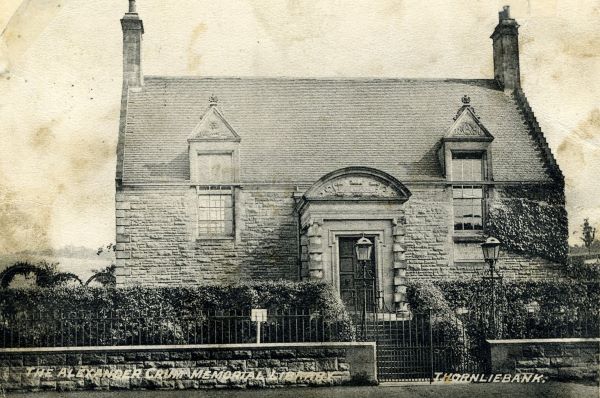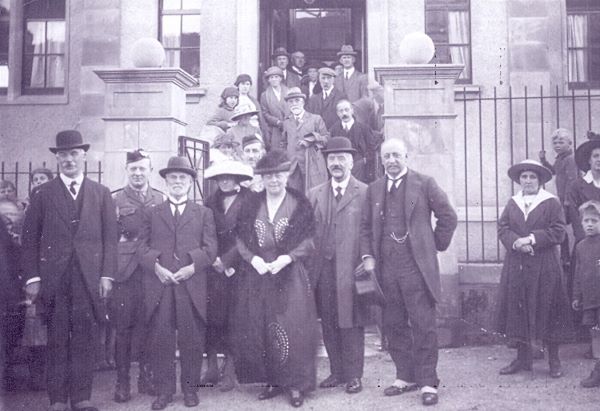

Library Buildings
Library Buildings
Alexander Crum Memorial Library, Thornliebank
The Alexander Crum Memorial Library was built from funds raised in Thornliebank village to commemorate Alexander Crum of the Thornliebank Printworks, who died in 1893. The printworks was the village’s main employer and Alexander was the was the parish’s main benefactor, contributing to housing, the village club, education, leisure facilities, Thornliebank Parish Church and other worthy causes.
The library, formally opened on 5th January 1897, was designed by the eminent Scottish architect Sir Rowand Anderson. It is a single-storey building in the Scots Renaissance style and is B-Listed.

A newspaper article of the time, describes the library as follows:
The Library, which, when completed, will be a handsome building, occupies a site given by the Thornliebank Company Limited, opposite the gate of the printworks and will thus afford in particular a suitable resort for the employees at meal hours, besides giving them and the public an opportunity of spending profitably some of their leisure hours. The reading room is 24ft. by 48ft., and is well lighted on all sides by large windows high enough to admit a range of bookcases to accommodate 5000 volumes being placed against the walls. Situated at the back is a book store, which is capable of holding 3500 volumes… Adjoining the book store is a committee-room.
It was refurbished in 1986 when the height of the ceiling was reduced and insulated and modern lighting and heating systems put in place.
Busby Library, Duff Memorial Hall
As a memorial to their sons Lieut. John Mitchell Duff and Lieut. William Duff, both killed in WW1, the Duff family, prominent members of the Busby community, presented the village with the Duff Memorial Institute in 1921/22. The family commissioned painting of the brothers which now hang in the halls.
The hall was built on a site known as Nelson’s Land which was owned by Mrs. Elizabeth Wilson of Greenock.
The Institute housed baths, a library, a reading room and a social and recreation room where people could meet to play games such as dominoes and cards. The cost of the building was £10,000. A Mr. Mitchell of ‘Beechwood’ also donated £2500 which was used to set up the library.

Mr William Duff had been a jeweller with Davis, Duff & Co., Glasgow and was a prominent member of the Busby community. He held the office of Session Clerk in Busby West Parish Church for 36 years from 1894 – 1930. When he died in 1934 Mrs Duff gifted the Communion Table and chairs to the church in his memory.
At the ceremony which marked the opening of the library on Saturday 10th September 1921, Mr Duff gave his reasons for such a generous donation:
…Only those who had passed through such sorrow could fully realise all that it meant. The war had brought bereavement to many homes and sorrow to many hearts in Busby as elsewhere and so there was a need for mutual sympathy and a spirit of helpfulness. The motive underlying the presentation of the Library was not only one to commemorate his two sons, but to provide something which for years to come would be of service and value to the entire community…
In 1953, the Library section of the Duff Memorial Hall was incorporated into Renfrewshire County Library Service. By that time, the baths and pool had been removed. In 1959, the premises were formally sold to Renfrew Educational Trust on behalf of Busby District School.
The Duff Memorial Hall now houses Busby Library and Halls and is managed by East Renfrewshire Culture & Leisure
